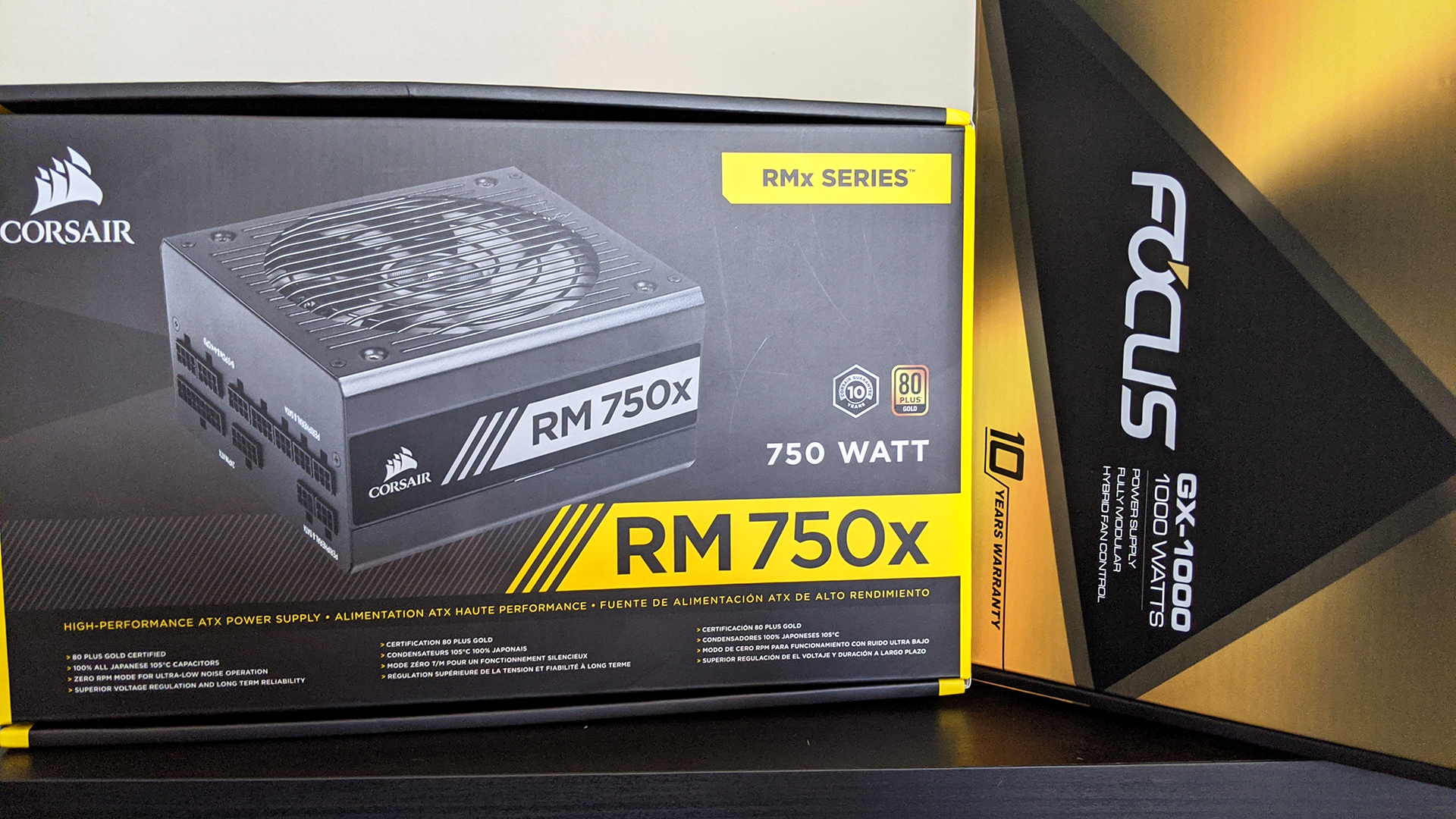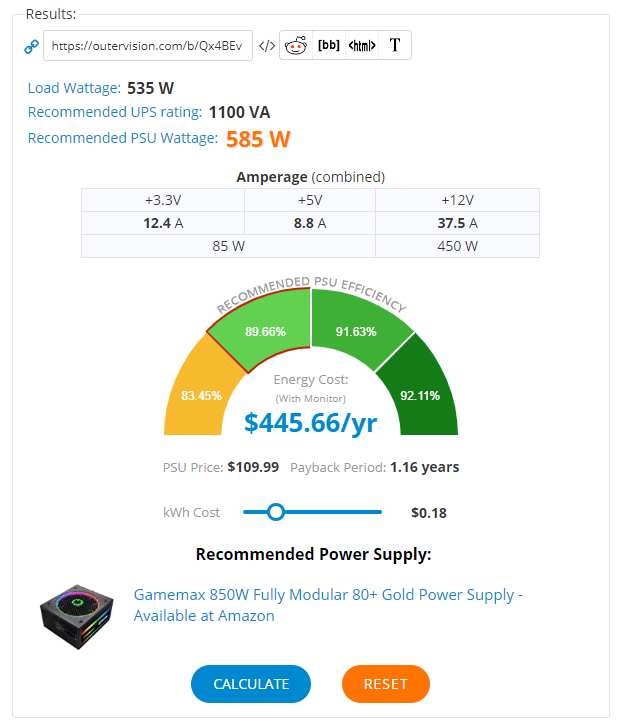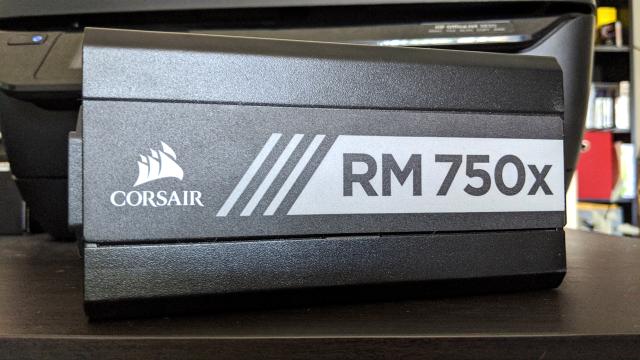Figuring out how much power you need to keep all your components fed and happy is usually the last part of building your own PC. It can also be the most confusing. Every component takes a different amount of power, and the bigger and faster your PC, the more power you need. The latest Intel Core i9-10900K can suck up to 250W or more alone, and so can Nvidia’s RTX 2080 Ti. Big, bad systems mean you’ll need a big, bad power supply unit (PSU). But how big? And what if you want to go even bigger than some tablecloth maths suggests you need? The power supply isn’t like other components in your computer, bigger is actually better. Here’s how to figure out how big a power supply you need.
But first, let’s go over what you need to know before you start scouring Newegg and Amazon. There are two main terms that you should understand: Wattage and Efficiency.
Wattage is pretty simple: it’s the maximum amount of power a PSU can supply under a 100% load. If you built a PC that needs 500 watts of power, then you’ll need a 500W PSU. But realistically you’ll want to get a PSU than can output a bit more power than what your PC needs because always maxing out your PSU load decreases the life of your PSU, especially if its efficiency rating is low.
Which brings us to efficiency. That is how well a PSU can convert the AC power from your wall outlet to DC power for your PC. It’s always described in percentages. For example, a 500W PSU with a 50% efficiency rating means it will need to draw 1000W from the wall to run at full, or 100%, load, which creates a lot of heat and wasted energy. But a 500W PSU with just 50% efficiency would be terrible for your computer as that extra 500W is wasted on heat, and excess heat can damage computer components. To further complicate things, most PSUs run at maximum efficiency not at 100% load, but at a 50% load. So in the case of our theoretical 500W PSU with 50% efficiency, it’s most efficient when it’s outputting only 250W of power.

This is where 80 Plus efficiency ratings come in. Most PSUs sold don’t have a 50% efficiency, but an 80% efficiency. Remember, the better a PSU’s efficiency, the less excess power it will need to draw. And the less excess power it needs to draw, the less heat it outputs, saving your PC components from degrading as fast. So, let’s say your 1000W PSU has an 80% efficiency rating. That means to run a PC that needs 600W at max load, it’s only pulling 800W of power and outputting 200W of that as heat. As long as your high-wattage PSU also has a high-efficiency rating, there’s no harm in getting a large one if you’re willing to spend a premium.
But there’s one more thing to consider when choosing a PSU. You’ve probably already noticed that many PSU brands like Corsair, EVGA, and Seasonic have 80 Plus ratings along with Bronze, Silver, Gold, Platinum, and Titanium ratings. Both ratings indicate the power efficiency, but the metal-labelled ratings break those efficiency ratings down even further. 80 Plus certification means that a PSU is at least 80% efficient at 20%, 50%, and 100% loads. So if a 500W supply is 80 Plus rated, it would draw a maximum of 625W from your wall outlet at 100% load instead of 1000W. It also means your PSU is going to output less heat.
Here’s a chart that breaks down the efficiency rating per load per each tier of metal, but the rule of thumb is the higher the quality of metal, the better the efficiency. An 80 Plus Gold certified PSU, for example, is at least 87% efficient at a 20% load, 90% efficient at a 50% load, and 87% efficient at a 100% load. Platinum and Titanium certifications see efficiency ratings into the ‘90s, while Bronze and Silver are in the mid to low ‘80s.

OK, that’s all well and good, but what PSU should you actually get? OuterVision has a nice, simple tool that will do all the calculations for you. Just input what components you have in your system, and it will spit out a few PSU recommendations. If you like to overclock your components, they have an advanced option too that will take those speeds into account. It will even tell you how much it costs per year to run your PC.
For my PC with a Ryzen 7 2700X, GTX 1080 Ti, 16 GB DDR4 RAM, 1 TB NVMe M.2 SSD, 2 TB 7200 RPM HDD, and a NZXT Kraken X52 240mm AIO Liquid Cooler, the tool recommends that I get a 80 Plus Gold certified 850W PSU. If my PSU was Platinum certified, however, I would be getting a better efficiency. Or I could skip the 850W PSU altogether and bump up to 1000W Platinum and get better efficiency according to the tool. After recently running into some lower than expected performance while benchmarking new processors I’ve got to admit the bigger PSU seems awfully appealing.
While a higher wattage PSU is overkill if you don’t actually need one, they won’t hurt your PC. And it’s better to go hard then to underpower your PC. At best, your CPU, GPU, and other components will run slower than their advertised speeds. At worst, various components will shut down to conserve power and make your computer crash.
